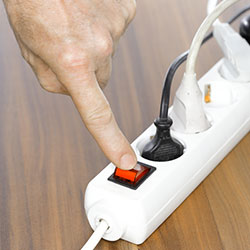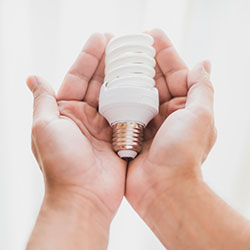Many Singaporeans are now working from home in efforts to stem the community spread of COVID-19, causing a shift in energy use. How can individuals manage higher electricity bills for the upcoming period?
As part of ongoing efforts to flatten the curve, work-from-home orders are being implemented nationwide. Earlier this year, firms were encouraged to minimise the frequency of social interactions and contact among employees through staggering work report timings, rotational team shifts and optional work-from-home measures to lower risks. However, as the numbers of COVID-19 cases continue to rise, stricter measures were rolled out - with work-from-home orders being made mandatory.
With thousands working from home, many may notice higher electricity bills in the coming months. The shift in energy usage can be challenging for some - so how can you save on electricity costs during this period?

Working from home is undoubtedly a big lifestyle change. This is an opportunity to examine and evaluate the benefits and challenges that come with the arrangement.
A flexible schedule, zero commuting time and ability to cook healthy meals are among these benefits. On the flipside, distractions at home and the mere willpower to get started on big projects can be difficult if the energy at home is not equivalent to the office. There are always two sides to a coin - working from home can be a productive change to take refuge in during this sensitive time.
Endless Zoom and Skype meetings with clients and colleagues alike can extend the number of hours you spend on your desktop daily, consequently increasing the amount of time your lights and air-conditioners remain turned on. Likewise, leaving chargers plugged in and the television running in the background can amount to incremental costs on your electricity bill.
All things considered, it can be helpful to understand how you can save on electricity bills whilst still remaining productive for work. Lowering your energy consumption or shifting your habits do not necessarily have to impact productivity levels. Now that we have the open electricity market, is it time to switch to a better electricity plan and earn substantial savings as we look forward to a future of more time spent indoors?

The biggest culprit of high electricity consumption are vampire sources. These refer to electronics such as your monitor, laptop, chargers and printers that remain plugged in even when they are not in use.
Perhaps you like having the television turned on in the background as you work - but leaving electronics plugged in or operating when they are not being actively used can waste both electricity and money. The downside of vampire sources is that people often tend to forget about them being plugged in - which only contributes to the accumulation of energy costs over time.
The easiest way to cut down on these is to simply unplug all these devices when you are not using them. Unplugging your devices can also help you boost your productivity levels by minimising distractions around your house.

Natural lighting is a great way to save on energy consumption during the day. Instead of using your room’s overhead lighting, set up your workstation near a big window where you can get a good amount of natural lighting during the day. As the day progresses, you can turn on the overhead lights or a desk lamp to brighten your room. Not only does natural lighting brighten a room without incurring any electricity costs, it also improves overall mood and productivity.
If you are not able to get natural lighting, opt for desk lamps instead of overhead lighting. Task-based lighting, in other words, only lighting areas you need - can also go a long way in helping you save electricity.

Your electrical appliances make up a fairly significant percentage of your electricity bills. Across a variety of housing types, air-conditioners, water heaters and refrigerators account for approximately 75% of the total electricity consumption.
Switching to energy efficient appliances can help reduce your overall electricity consumption by utilising the minimum energy required to complete a task. Examples of energy efficient appliances include energy-saving light bulbs and solar water heaters. Before purchasing your electrical appliances, check for the Energy Labels affixed on them.
Between air-conditioners and ceiling fans, the latter is definitely cheaper when used over time. Leaving your air-conditioner turned on for long periods of time - for instance, the entire day as you work from home - can reflect high electricity bills.
As an alternative, cool down the room with the air-conditioner by setting a timer of an hour or two to it. After which, the ceiling fan comes in handy with air circulation and a cool breeze as you work.
It is likely that you will be cooking more often than not during this stay-home period. Use these tips to help you save electricity.
Working from home can and will definitely impact your electricity bills. When you work from home, you will be incurring a higher amount of energy use - cooking, making coffee, charging laptops and desktops, watching television and using overhead lights. You are also plugged in during times that you would otherwise be at the office.
This could be a good time to think about switching to an electricity provider that offers lower rates. With the liberalised Open Electricity Market, there are a number of electricity retailers offering innovative and flexible electricity price plans for consumers in Singapore.
Senoko Energy offers electricity plans that are flexible and interest-driven. What does this mean? Consumers get to pick electricity price plans that match their needs and energy use consumption habits at home - some of these plans even come with value add-ons like entertainment promotions and cash rebates. The leading homegrown electricity retailer also offers low fixed rate electricity price plans for consumers looking to maximise on cost-savings while they work from home.

Connect with our friendly customer solutions team to find out more about our price plans.